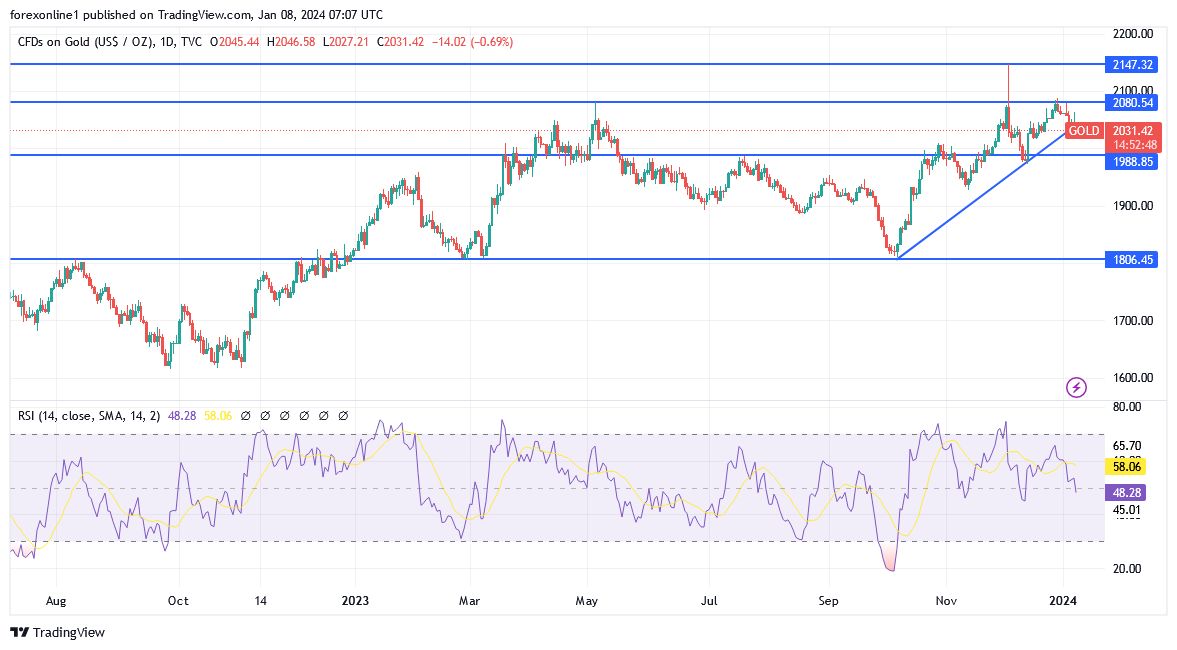Gold Price Analysis Today: Gold’s Trend Is Still Bullish
Strong US job data led gold to retreat from $2065 to $2025 per ounce, balancing against a strong dollar, global tensions, and central bank gold buys.
By the end of last week's trading, gains in the price of gold (XAU/USD) were negatively impacted by stronger-than-expected U.S. job figures, which could support the tightening of the U.S. central bank's policy. Consequently, the price of gold retreated from the resistance at $2065 per ounce to the support level at $2025 per ounce, settling around $2031 per ounce at the time of writing this analysis. Despite the strength of the U.S. dollar, which has a negative impact on gold, the yellow metal continues to receive positive momentum from global geopolitical tensions and increased central bank purchases of gold.
(Click on image to enlarge)

Before that, the price of gold rose with a decline in Treasury bond yields when the US employment measure came in below estimates, which strengthened expectations that the Federal Reserve would cut interest rates quickly this year. Also, the US services sector was close to recession at the end of 2023, as the employment measure showed the largest contraction in more than three years. Moreover, the employment in the services sector represents the lion's share of the US economy, so a slowdown could pose a threat to growth and could lead to faster interest rate cuts by the Federal Reserve.
Treasury yields and the dollar fell after the latest report from the Institute for Supply Management, erasing gains made by strong jobs data earlier on Friday. This boosted the yellow metal by up to 1 percent, reversing a loss of 0.9 percent earlier. Swap traders had increased bets on a cut in interest rates by March.
According to analysts, the employment footprint "convinces the market that jobs will weaken. This has led to the rise in the price of gold to nearly $2060." Adding, "we believe that gold traders are pricing in the Federal Reserve more aggressively than the Federal Reserve wants to be" in terms of monetary easing this year.
Usually, Bullion has an inverse relationship with interest rates – the lower the rates, the higher the price of gold. According to trading, the price of the yellow metal has stabilized above the psychological resistance of $2,000 per ounce since mid-December, despite policymakers retreating from expectations regarding strong monetary easing in the near term and data indicating a strong American economy. Earlier Friday, data showed that US nonfarm payrolls rose by 216,000 in December, higher than economists' average estimates, while wages rose more than expected. These numbers caused revenues and the dollar to rise, which led to a decline in the price of gold.
Generally, gold futures speculators look to the fortunes of the US dollar to get their basic trading signals, and then do the opposite. So, they dumped huge gold futures contracts as the US dollar index (USDX) rose.
The U.S. stock indices on Wall Street concluded their worst week since Halloween on a lukewarm Friday, as reports indicated that workers are getting larger increases, but key parts of the economy still do not appear to be overheating. According to the trades, the Standard & Poor's 500 index rose by 8.56 points, or 0.2%, to 4697.24 after fluctuating between small gains and losses throughout the day. It marked the first weekly, decline for the index in the last 10 days, after starting 2024 with the hope that inflation and the overall economy would calm enough for the Federal Reserve to sharply cut interest rates during the year.
Meanwhile, the Dow Jones Industrial Average rose 0.1% to 37,466.11, approaching the record it set earlier in the week. Also, the Nasdaq Composite Index rose 0.1%, to 14,524.07.
Sharply, Treasury yields swung in the bond market after the economic reports. It initially rose after the latest monthly jobs report showed that US employers unexpectedly accelerated their hiring pace last month. Also, average hourly wages for workers rose when economists had expected them to decline. Therefore, these strong numbers are good news for workers and should keep the economy active. This is positive for corporate earnings, which is one of the main factors that determine stock prices.
Shortly, what worries Wall Street markets is that the strong data may also convince the Fed that upward pressure on inflation remains. This, in turn, could mean that the Fed will keep interest rates high for longer than expected. Clearly, interest rates affect the other big factor that determines stock prices, as high interest rates hurt financial markets.
Gold Price Forecast and Analysis Today:
Despite the recovery of the US dollar following stronger-than-expected US job data “XAU/USD” are still on an upward trend and could remain so if they do not fall to $2,000 or $1,985 per ounce. Therefore, Increased global geopolitical tensions and central bank purchases for hedging purposes will remain supportive factors for the gold market for some time. furthermore, any pullback in gold prices will be a buying opportunity. Currently, the nearest resistance levels for gold are $2,045 and $2,070, respectively.
More By This Author:
EUR/USD Forex Signal: Consolidation Below $1.1000Coffee: Weekly Forecast 7th January - 13th January
Weekly Forex Forecast - Sunday, Jan. 7
Disclosure: DailyForex will not be held liable for any loss or damage resulting from reliance on the information contained within this website including market news, analysis, trading signals ...
more


